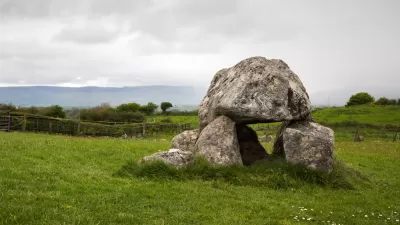For some time researchers have noticed more instances of non-affective psychosis in urban populations than in rural groups. Now the American Medical Association has found "certain elements of city living raise the risk of developing schizophrenia."
"While it appears that genetics play a strong role in a person's risk for schizophrenia, environmental factors may play a role in whether the disease manifests itself," writes Lane Wallace.
The researchers wanted to find what it was about urban living that increased the risk. The factor that showed the strongest correlation was later termed "social fragmentation." "In very stable, homogeneous communities (often the case in more rural environments), the social norms and bonds are very consistent and strong. But in urban environments, where there tends to be much more diversity and movement within communities, social ties are often more fragmented. And that fragmentation is felt most among people who move often, or feel like "outsiders" in a particular community."
Dr. Stanley Zammit, who headed the study out of Cardiff University in Great Britain, emphasized that we should not draw too many conclusions from just one study and more research is needed. It is also important to bear in mind that while correlation is important it doesn't prove causality.
FULL STORY: Can Cities Make Us Crazy?

Alabama: Trump Terminates Settlements for Black Communities Harmed By Raw Sewage
Trump deemed the landmark civil rights agreement “illegal DEI and environmental justice policy.”

Study: Maui’s Plan to Convert Vacation Rentals to Long-Term Housing Could Cause Nearly $1 Billion Economic Loss
The plan would reduce visitor accommodation by 25% resulting in 1,900 jobs lost.

Why Should We Subsidize Public Transportation?
Many public transit agencies face financial stress due to rising costs, declining fare revenue, and declining subsidies. Transit advocates must provide a strong business case for increasing public transit funding.

Wind Energy on the Rise Despite Federal Policy Reversal
The Trump administration is revoking federal support for renewable energy, but demand for new projects continues unabated.

Passengers Flock to Caltrain After Electrification
The new electric trains are running faster and more reliably, leading to strong ridership growth on the Bay Area rail system.

Texas Churches Rally Behind ‘Yes in God’s Back Yard’ Legislation
Religious leaders want the state to reduce zoning regulations to streamline leasing church-owned land to housing developers.
Urban Design for Planners 1: Software Tools
This six-course series explores essential urban design concepts using open source software and equips planners with the tools they need to participate fully in the urban design process.
Planning for Universal Design
Learn the tools for implementing Universal Design in planning regulations.
Caltrans
Smith Gee Studio
Institute for Housing and Urban Development Studies (IHS)
City of Grandview
Harvard GSD Executive Education
Toledo-Lucas County Plan Commissions
Salt Lake City
NYU Wagner Graduate School of Public Service




























